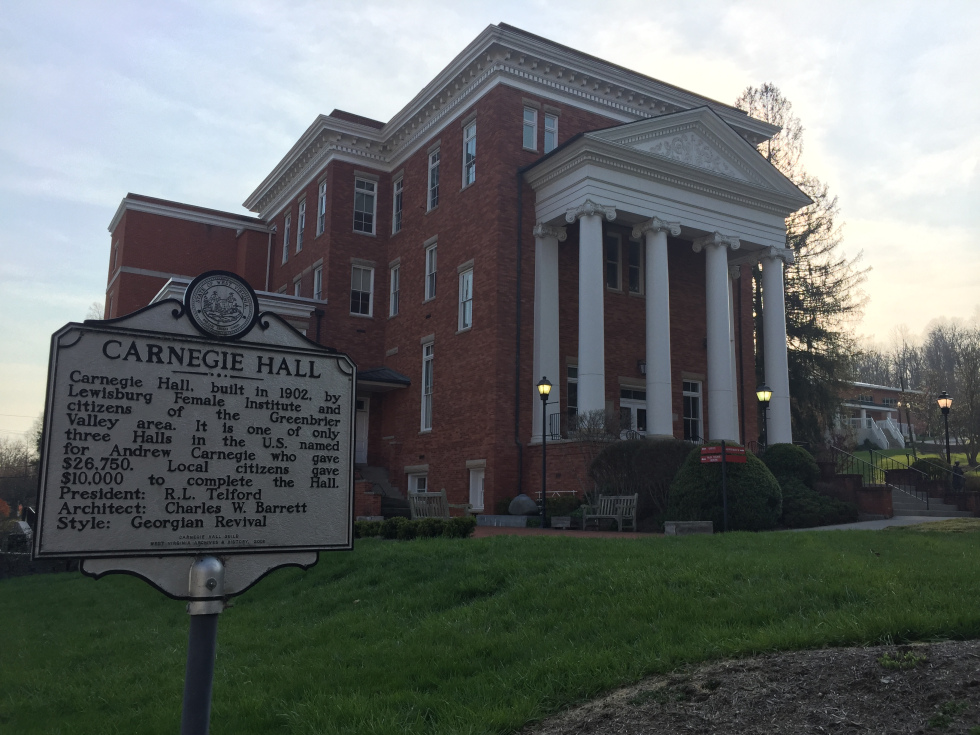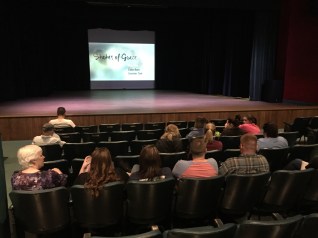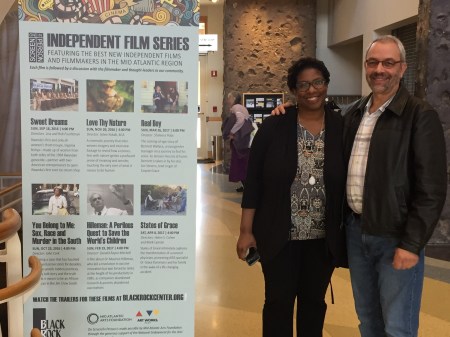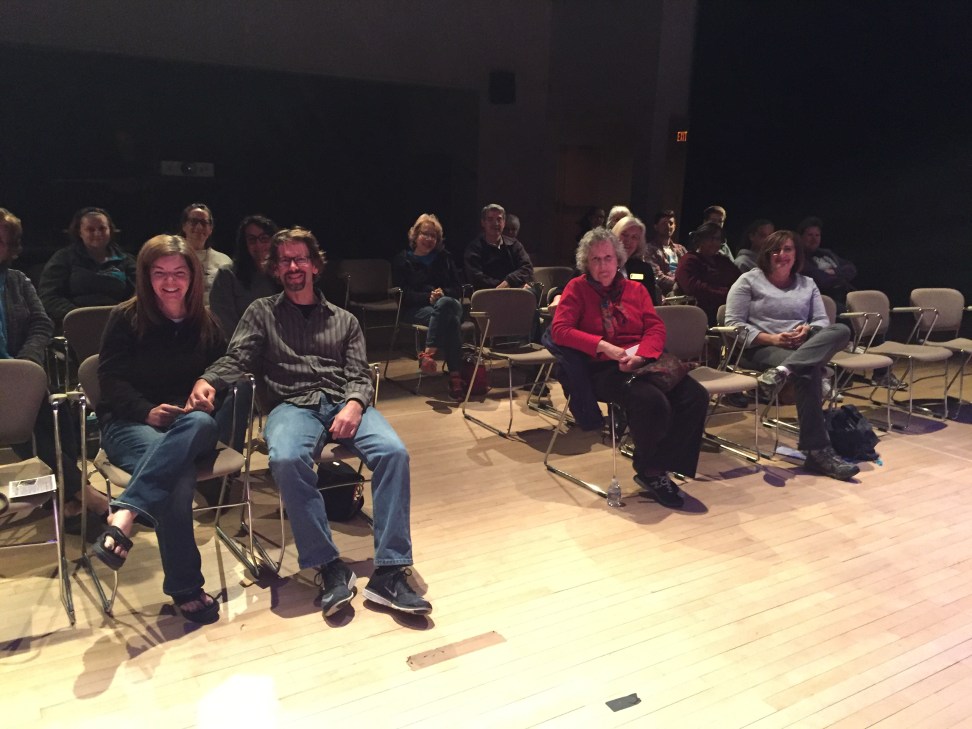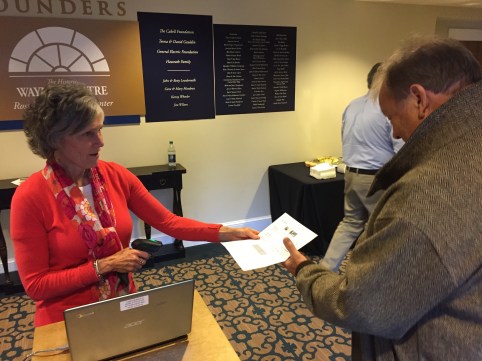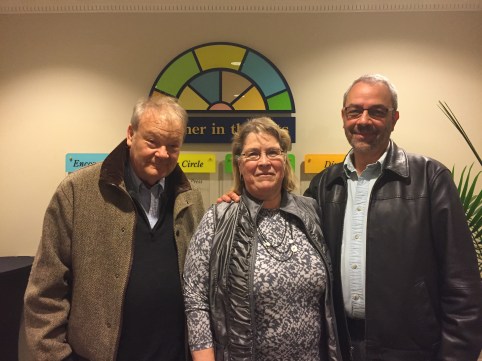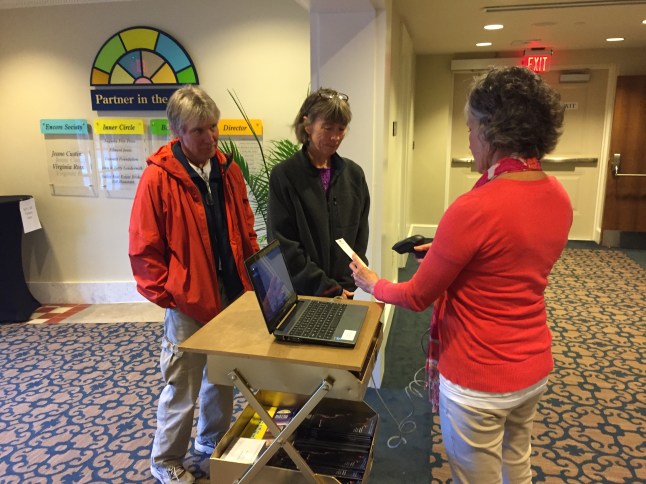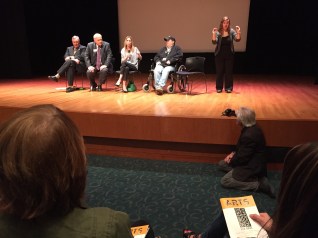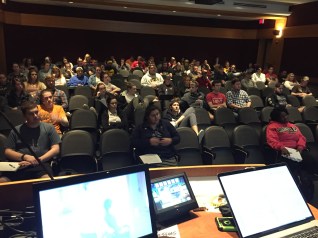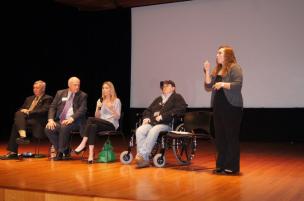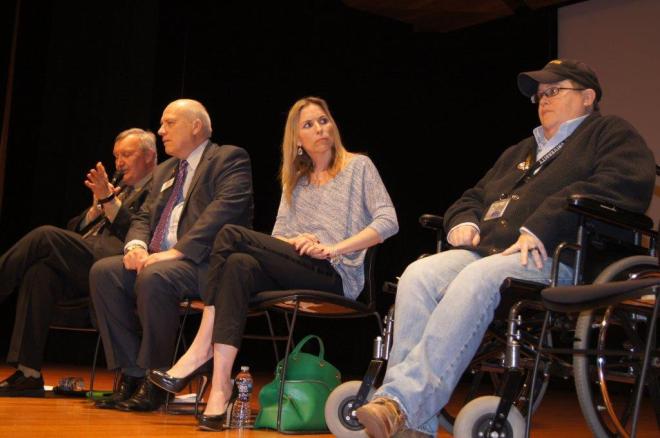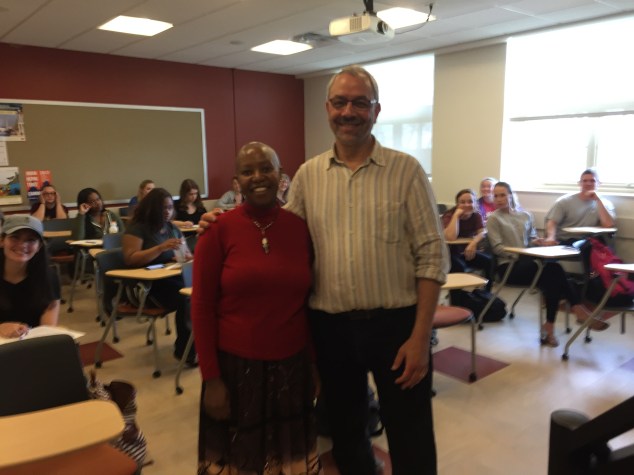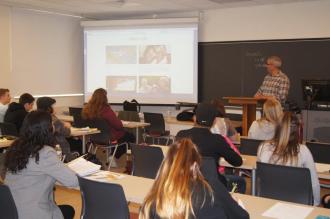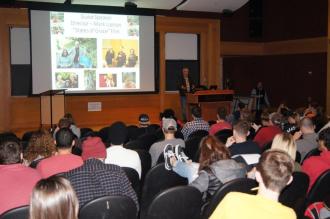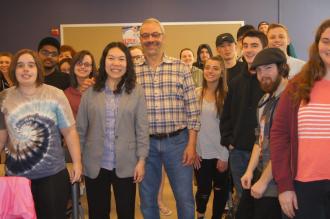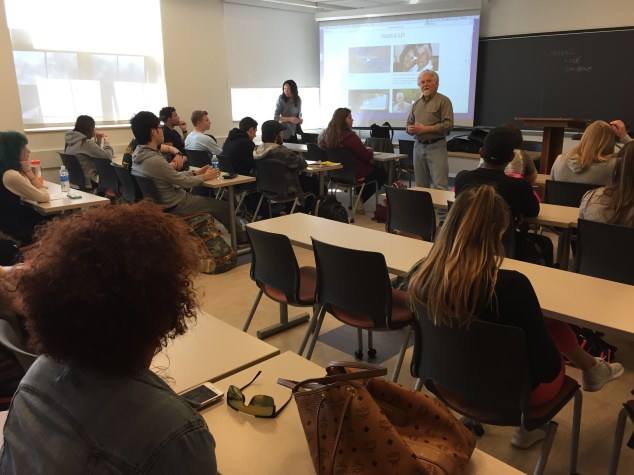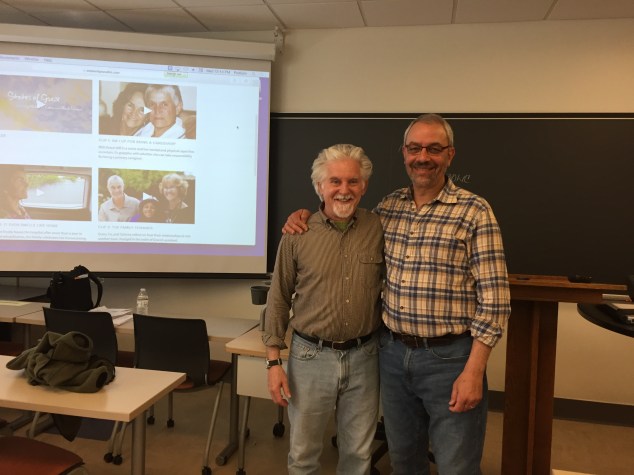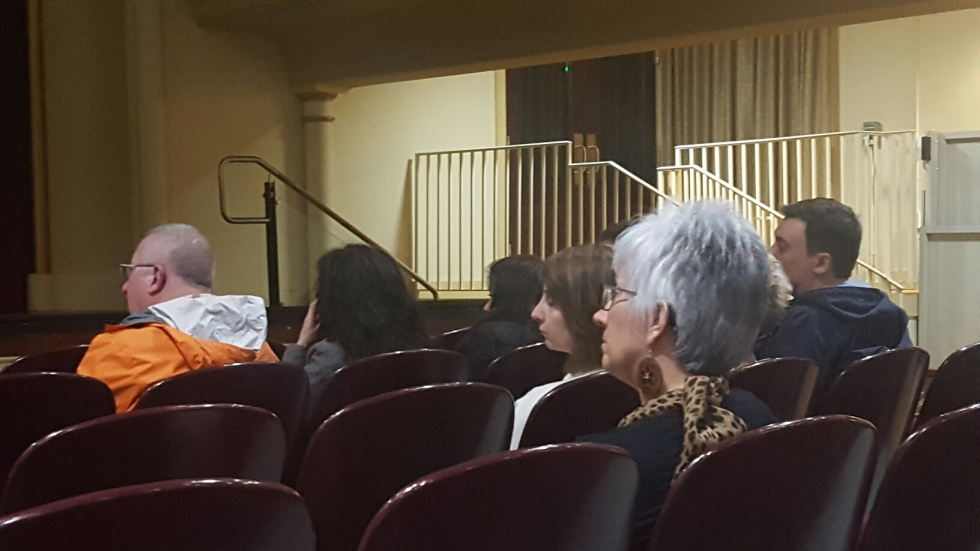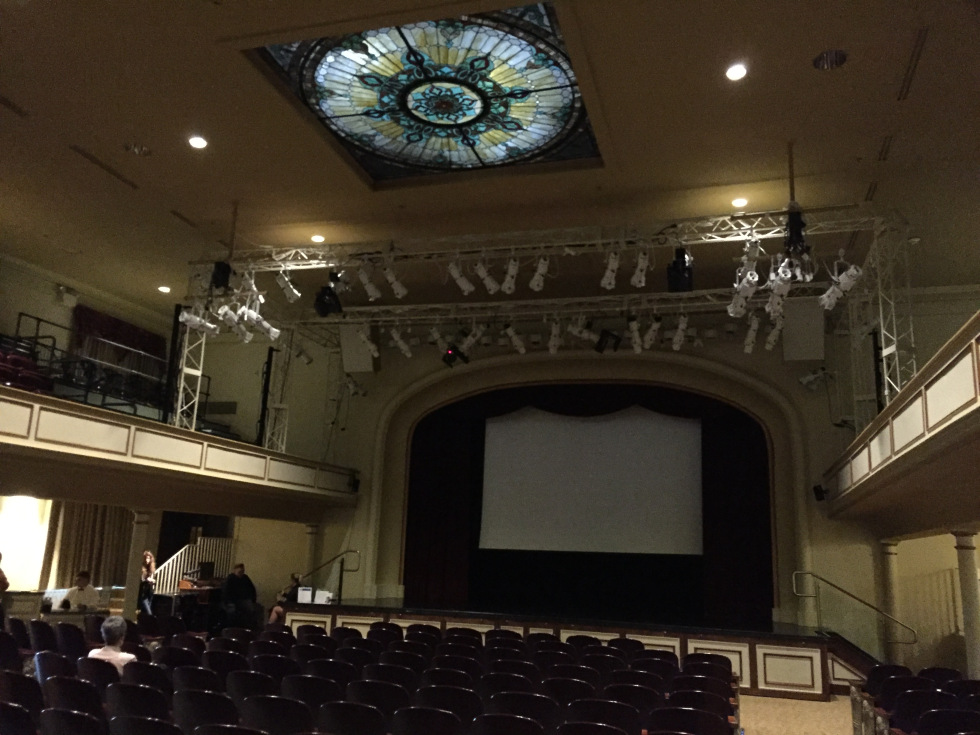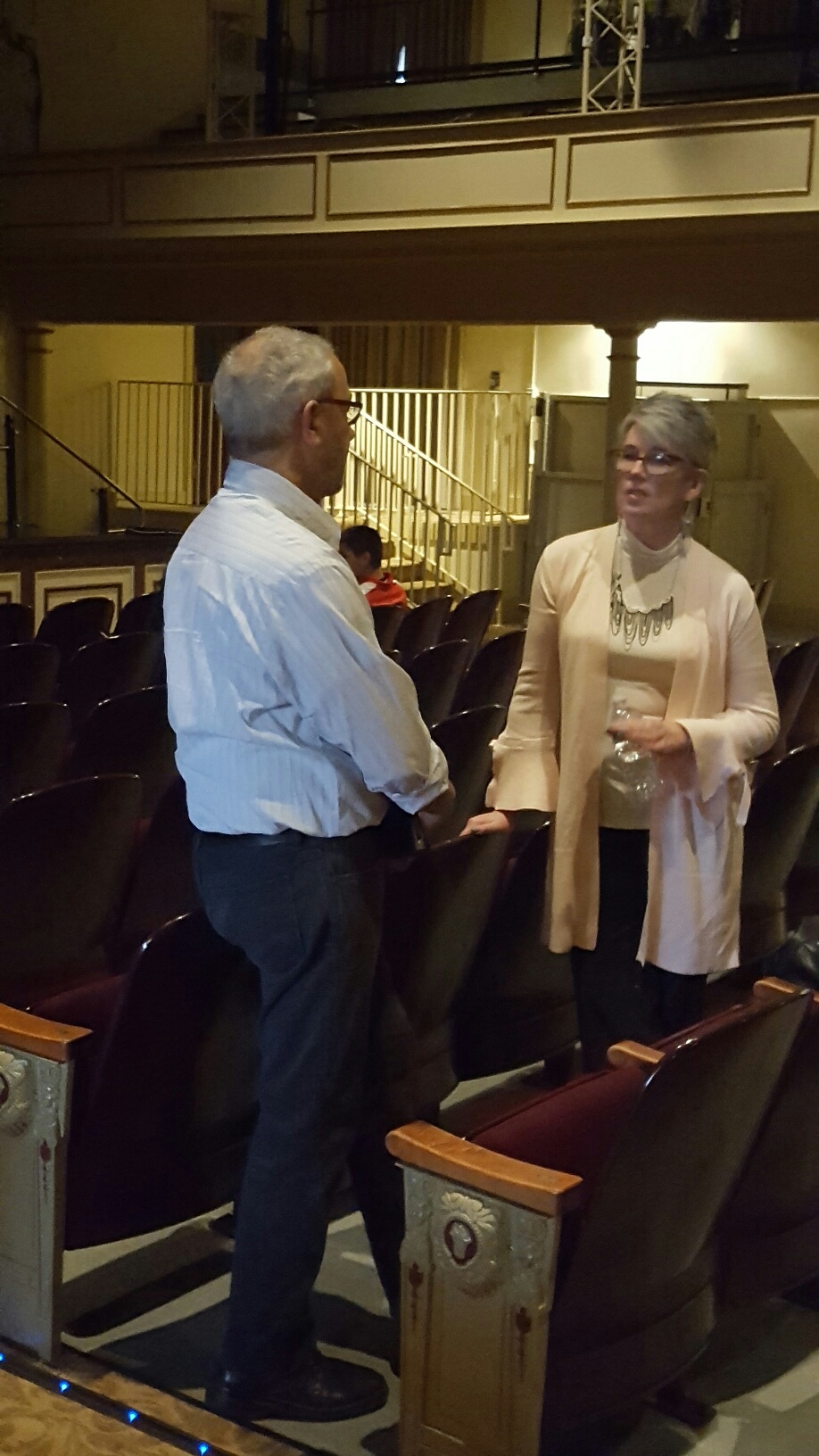April 13, 2017 | Blue Bell, PA
There has been a lot of planning around this visit and I have received a detailed schedule from Brent Woods, senior director of cultural affairs that includes a tour of their communications facility with Gerry Collom who teaches filmmaking there. It’s well equipped and I enjoy getting to know Gerry a bit and hearing about the program and how it serves a very broad range of students.
Events conspire to bring us a small audience and I use that as an opportunity to turn the Q&A into more of a conversation, asking folks about their reactions to the film and anything that stood out for them. A young man leads off by commenting how an accident like this could happen to anyone at any time and it’s clear that he can relate tothe experience of someone who is quite different from himself.
A retired occupational therapist comments on Grace’s tremendous motivation and how rare it is to see a patient like this. I let her know how much Grace’s therapists enjoyed working with her and how much her attitude impacted the quality of care she received. Before making the film, I hadn’t understood how much reciprocity there is between caregiver and care receiver and how much the patient’s attitude impacts the therapist.
We have an interesting conversation about Fu’s 5-year commitment to caring for Grace, something that has come up in other screenings. One person sees Fu as being cold and withholding while most others see this as an act of generosity and good boundary setting, especially since Grace and Fu aren’t intimate partners in a traditional (or non-traditional) marriage. This leads us to talk about the types of expectations that accompany relationships and how, in any type of relationship, it’s important to articulate and negotiate those expectations.
Toward the end of the discussion a woman expresses a view of Grace’s story that I haven’t heard before – that you can see a divine plan behind all of this. Grace becoming a doctor, Grace and Fu becoming partners and adopting Sabina, the two of them being Buddhists and living in community all create the circumstances for Grace to survive the accident, be well cared for, and heal sufficiently to create an innovative pain clinic that continues to help people.
April 12, 2017 | Reading, PA
It’s almost 400 miles to Reading and I can’t believe I’ve logged close to 1700 miles already. I’m finding endurance I didn’t know I had and am enjoying seeing the countryside in such a variety of locales.
The Miller Center is a great venue in the midst of a community that is almost 60% Latino. An ESL class in civics makes up a significant part of the audience and I’m happy to be able to offer Spanish subtitles which a couple of the students need. Brett, the technical director, is able to make this change at the last minute and we do a final sound check while people already seated in the theatre look on.
Watching the film with these subtitles is a first for me. We’ve shown it with English subtitles for the deaf and hearing impaired and with audio description for the blind and visually prepared, but not in Spanish. I’m very glad we can accommodate so many different types of audiences.
Talking with Brett earlier, I realize that I need to rethink my notion of audience and how to gauge the impact of the film. It turns out that Brett was on the review committee that helped select the films for OSIP and has a son with Cerebral Palsy, which Sabrina also has. He brought the film home to show his wife and we talk a bit about raising a child with a disability and some of the life decisions he’s made to accommodate his son.
For Q&A Cathleen Stephen, the director of the Miller Center, has invited Cynthia Huls, director of Visiting Angels, a home care service, and Zuleyka Lopez, one of her home care providers, to participate. Cynthia notes that in her experience, the level of support Grace has through her many networks of friends and colleagues is unusual and that many of the people they care for are far more isolated. Everyone agrees that emotional support plays a critical part in caregiving and Zuleyka notes that there are times she just sits with her patients keeping them company.
April 10, 2017 | Lewisburg, WV
Two hundred miles later I’m in Lewisburg, trying not to make bad jokes about finally playing Carnegie Hall (yes, it takes lots of practice). Walking around town in the afternoon, a gentleman asks where I’m from. Turns out I’m talking with the mayor of 14 years, John Manchester. He already knows about the screening that night and has it on his calendar, but a fundraiser that evening means that only his wife will be there. Still, it’s great how the word gets out in a small town and how appreciative folks are of these kinds of cultural events.
Lynn Creamer, my host, has invited a nursing class to the screening and they enter as a group along with their professor. In the Q&A one of them comments on how important it is to see the impact of Grace’s accident on the entire family, that in the hospital they only see the patient and only for a short period of time. The film helps remind them that there’s a much larger context for the patient who is lying there in the bed. Another student comments on how much she liked Sabrina’s (Grace’s daughter ) frankness. During the screening I could hear lots of chuckling in response Sabrina’s teenage snarkiness and realized that they are not so far removed from that time in their own lives.
An older woman who has dealt with her own disability notes how much power you have as a caregiver and how you have to give that up as a patient. She identifies with Grace feeling like she is a burden and talks about how important it was for Grace to return to work and continue to serve others.
It’s interesting how the film speaks to people in a wide variety of circumstances. A young man says that what really struck him was Grace saying, “If you can, you must” as shestruggles to maneuver in a bathroom. I ask why this stood out for him, expecting something related to disability, but he replies that he has just moved to Lewisburg and lost his job shortly after arriving. He is feeling quite depressed and discouraged, but Grace’s words inspire him to keep moving forward with his life.
April 8, 2017 | Germantown, MD
I am actually driving from Durham, NC which isn’t on the OSIP itinerary, but I have managed to fit it into my travel schedule. Father’s Day, a film I completed in 2003, had an encore screening at the Full Frame Documentary Film Festival as it celebrates its 20th anniversary. It screened there in 2004 and the artistic director has invited one film from each of the last 19 festivals back for their “thematic” program. It’s a great honor and especially meaningful as this is a film about my father’s sudden death when I was 17 and a project I worked on for over 20 years.
During the production of States of Grace I often thought that the making of Father’s Day is what prepared me for it, both artistically and emotionally. Both are films, in part, about sudden loss, grieving and finding meaning within a new and altered reality. Father’s Day has no sync sound. It is based on audio recordings of family members and our family doctor and visualizes the story using old home movies, photographs, documents and scenes in nature which I recorded – a snowfall, rippling water, and waterfalls.
When we started working on States of Grace, Helen and I agreed that we wanted it to be a poetic film, that it would need the beauty of nature to balance the challenging emotional terrain it covers. We didn’t know quite what that would mean, but I think the nature scenes in States of Grace (snow geese lifting up from a pond, birds in flight, reflections in ponds, clouds) are direct descendants of the imagery in Father’s Day.
We get into some of this during the Q&A at BlackRock and it seems fitting to have this conversation in an art center (there has just been an artist talk in the gallery adjacent to the screening space). The place exudes creative energy and the audience is clearly up for this kind of discussion.
I am also asked about privacy issues. Did we have any concerns about showing the tough moments Grace went through? I explain that Grace gave us complete permission to make the film as we wanted to and didn’t even see a cut until it was almost completed. There was an enormous amount of trust and the issue we struggled with during the editing process wasn’t around privacy as much as balance – finding the right balance between the tough moments and the positive ones in order to create a story that was realistic and true to our experience of Grace’s experience.
For me the day is capped off with a performance of Ragu Dixit at BlackRock. I had gotten a ticket to this sold-out performance weeks ago and am one of the few white faces among the Indians who have come out to see a cultural hero from southern India. This is a family affair with many young children and dancing in the aisles as the evening goes on. People introduce themselves to me and sometimes provide translation when Ragu speaks directly to them in their own language. If there is any question about the power of culture to unify, animate and uplift, it should have been laid to rest that night.
April 6, 2017 | Waynesboro, VA
It is a beautiful drive through rolling hills dotted with farms and small towns, not unlike the area in northeastern Connecticut where I grew up. Spring is on fast forward as I head south – the trees are budding and there are no more hints of snow. When I arrive the theatre is bustling with a board meeting, followed by a meeting of volunteers and I get to meet some of the folks who help the theatre function. It’s a beautiful facility, open just about a year, with a very professional and friendly crew.
During the Q&A a local minister I had spoken with in the lobby earlier says he was thinking about my role in the filmmaking and asks how it has impacted my life, since this was such a big deal over such a long period of time. I agree that it was life changing on many levels. Professionally I reengaged with my love of cinematography which is where I began as a filmmaker 35 years ago before moving into the editing room. And personally I think the most profound change is a movement toward gratitude…gratitude for being alive and sensate. With all the challenges they faced, Grace and Fu retained this attitude which was remarkable to see and a privilege to be around. It is essential to their practice of Buddhism and to who they are as human beings.
After this conversation, a hand goes up among a small cluster of people in the back of the theatre. A gentleman introduces himself as Ralph Dammann, Grace’s cousin. It’s a thrill to have him in the audience, especially since he says he hasn’t seen Grace since the accident and hadn’t seen the film before this. He and his wife along with another couple have driven from Charlottesville and they’re very grateful that we recorded Grace’s story. It makes my day.
April 4, 2017 | Lancaster, PA
Barry Kornhauser, my host for the screening, has told me that States of Grace is an especially good fit for Millersville University which has an interdisciplinary Disabilities Studies program as well as a growing Disability Arts program. Not only is this an OSIP screening, but it’s part of the university’s Disability Film Festival programmed by Dr. Thomas Neuville, a professor in Disability Studies, as well as a springboard to a series of events tied largely to disability.
Barry meets me at the hotel at 12:30 and it quickly becomes clear that I should have been working out at the gym and lacing up my running shoes to keep up with him. The afternoon consists of presentations in two classes: a combined group consisting of a Wellness class and a class in Social Psychology; and a class called Social Work in Mental Health. I show the trailer and clips from the film and talk about the film’s relevance to wellness in the broadest sense of the term – physical, social, emotional and spiritual. I’m a bit surprised at how much fun it is to present the film in this way and it seems well received.
Immediately after, we drive to the Ware Center stage where I’m interviewed by a local cable station and am quickly reminded why I chose to be behind the camera instead of in front of it. Although this type of interview is always challenging for me, it’s great that the film screening will have a life on cable TV after the event itself. The tech check goes well, followed by a delicious dinner of Vietnamese food which gives Barry and me an opportunity to schmooze.
There is an unusual format for the evening that consists of a panel discussion before the screening and Q&A afterwards. It’s quite a group of panelists: William Kepner, CEO & President of United Disability Services; Melissa Hawkins, Executive Director of the Disability Empowerment Center; Jan Bechtel, MU Director of Integrated Studies; and Brian Long, Lead Coordinator, Berks/Lancaster/Lebanon LINK to Aging and Disability Resources. ASL interpretation is provided by Laura Hoffer. Each speaks briefly about their perspective on disability and caregiving and makes suggestions about what to look for in the film. It’s a really nice way to set up the screening and leaves me to handle the Q&A afterwards. The audience is very enthusiastic and appreciative, as am I.
The next morning I am back on campus for presentations in two Speech classes with two different professors. This is a core curriculum class in Communications that is focused on public speaking. I use it as an opportunity to talk about how Grace prepared a 10-minute speech for the Unsung Heroes of Compassions awards where the Dalai Lama recognizes ten individuals from around the world who have performed significant humanitarian work. The ceremony took place about a year after the accident when Grace was still recovering in the rehab hospital. She worked with her speech therapist for four months to put it together – structuring the sentences and ideas, finding her breath and practicing the cadence.
It was a very rich and gratifying visit.
April 3, 2017 | Bloomsburg, PA
In all my years of filmmaking I’ve never toured like this with a film so I’ve been really looking forward to it, though the amount of driving is a bit daunting. The flight from San Francisco to Newark is mercifully uneventful, except for being delayed an hour and a half by some of the crew not showing up. On my way to Bloomsburg the next morning, I stop for a walk through the Great Swamp National Refuge. Spring has been in full force in the Bay Area since February, but is just starting to poke through here.
The screening takes place in Gross Auditorium in Carver Hall, a beautiful theater that has terrific projection and sound. The audience is small but I’m sitting behind a woman whose head nods often in response to the film which makes me very curious to know more about her. Turns out that Brenda saw an article about the screening that mentioned Laguna Honda Hospital where Grace worked as a physician both before and after her accident on the Golden Gate Bridge. And Laguna Honda is near and dear to her heart, having read “God’s Hotel,” a terrific book by Dr. Victoria Sweet who was a physician there for twenty years and is a colleague of Grace’s.
The hospital started as an alms house for the poor 150 years ago, serving San Francisco’s neediest people, and morphed into a hospital as it expanded to serve their medical needs. The book explores the concept of “slow medicine” which has been Laguna Honda’s approach until relatively recently. It views the body as “a garden to be tended rather than a machine to be fixed,” an approach that guided Grace’s creation of the HIV/AIDS clinic there in 1990. She and her partner, Dr. Daniel Rybold, signed over 1000 death certificates during that period and Grace was honored for her work by the Dalai Lama.
The Q&A focuses a lot on approaches to healing and Brenda even reads a couple of paragraphs from a copy of “God’s Hotel” that she brought with her. Nancy Pressman, who is involved with local rehab services, also provides information about resources that are available to the community.







